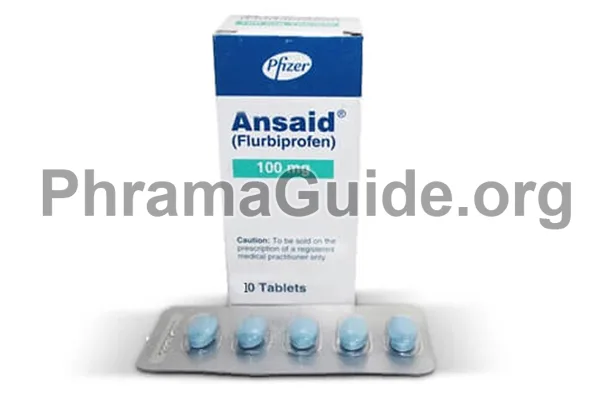Ansaid tablet is used to treat pain and inflammation. It is a nonsteroidal anti-inflammatory drug (NSAID) that effectively reduces pain, swelling, and joint stiffness from arthritis. Following are some common and off-label uses of Ansaid tablets:
Common Uses of Ansaid Tablet
- Pain Relief: Ansaid tablet is used to alleviate mild to moderate pain, including headaches, dental pain, menstrual cramps, muscle aches, and other types of pain.
- Inflammatory Conditions: Ansaid tablet is used for various conditions characterized by inflammation, such as rheumatoid arthritis, osteoarthritis, and ankylosing spondylitis.
- Musculoskeletal Disorders: Ansaid tablets may be used to manage pain and inflammation associated with musculoskeletal disorders, including sprains, strains, and other injuries.
- Dysmenorrhea: Ansaid tablets may be used to alleviate the pain and discomfort associated with menstrual cramps.
- Postoperative Pain: Ansaid tablets can be used to manage pain after surgical procedures, such as dental extraction or minor surgeries.
- Dental Pain: Ansaid tablets can be used to relieve dental pain, such as toothache, after dental procedures, or oral surgery.
- Gout: Ansaid tablets may be used to help manage the pain and inflammation associated with acute gout attacks.
- Tendonitis and Bursitis: Ansaid tablet may be used to alleviate pain and inflammation associated with conditions like tendonitis and bursitis.
Off-label Uses of Ansaid Tablet
- Migraine: In some cases, Ansaid tablets may be used off-label to help manage migraines, especially those with a significant inflammatory component.

What is Ansaid?
Ansaid is one of the leading brands of Flurbiprofen, manufactured and marketed by Pfizer Inc.
Ansaid Alternatives : Other Similar Brands
Here are some alternative brands of Ansaid and their manufacturers.
- Synalgo : Platinum Pharmaceuticals (Pvt) Ltd.
- Froben : Abbott Laboratories (Pvt) Ltd.
- Sanid : Stanley Pharmaceuticals (Pvt) Ltd, Pakistan.
- Inflamatix : Assian Continental Pharma, Pakistan.
- Biprofen : Martin Dow Pharmaceuticals (Pvt) Ltd.
- Dentifen : Macter International (Pvt) Ltd.
- Dol : Wilshire Laboratories (Pvt) Ltd.
- Dulpro : Global Pharmaceuticals.
- Vobifen : Novartis Pharma (Pvt) Ltd.
- Olgon : Himont Pharmaceuticals (Pvt) Ltd.
- Jasic : Libra Pharmaceuticals (Pvt) Ltd.
- Flurbin : Mass Pharma (Pvt) Ltd.
Ansaid : Available Formulations and Strengths
Presently, Ansaid is available in Tablet form
Ansaid Tablet : 100mg strength
Who Should Not Use Ansaid?
Despite its many benefits, there are some important contraindications and safety considerations when using Ansaid tablets.
- Allergy to NSAIDs: If you have a known allergy to nonsteroidal anti-inflammatory drugs (NSAIDs), including aspirin, you should not use Ansaid.
- Active peptic ulcer disease: Ansaid should not be used if you have an active peptic ulcer, as it can increase the risk of gastrointestinal bleeding.
- Bleeding disorders: Ansaid can interfere with blood clotting, so it should not be used in individuals with bleeding disorders, such as hemophilia or von Willebrand disease.
- Severe liver or kidney disease: Ansaid can be harmful to individuals with severe liver or kidney disease, and may need dose adjustment or close monitoring.
- Pregnancy: Ansaid is not recommended during pregnancy, especially in the third trimester, as it may cause harm to the fetus.
- Breastfeeding: It is also not recommended during breastfeeding, as it may pass into breast milk and harm the baby.
- Coronary artery bypass graft surgery: Ansaid should not be used before or after coronary artery bypass graft surgery (CABG) as it can increase the risk of heart attack and stroke.
What is the Recommended Daily Dosage of Ansaid Tablet?
Ansaid Usual Dose for Adults:
- 1-2 tablets Daily, in patients with severe pain conditions.
Ansaid Dose in Dysmenorrhoea:
- One tablet may be administered at the start of symptoms.
- Followed by one tablet taken at 6-8 hours intervals.
- The maximum dosage should not exceed 3 tablets of Ansaid/day.
Impotent Note About Ansaid Tablet Dosage:
To avoid GI disturbance, Ansaid tablets should be taken with or after food.
How Ansaid Works?
Ansaid is a non-steroidal anti-inflammatory drug (NSAID) that has the ability to inhibit the production of prostaglandins (COX-1 and COX-2) that decrease the proinflammatory cytokine levels, and it helps to reduce inflammation while providing analgesic effects.

Leave A Comment